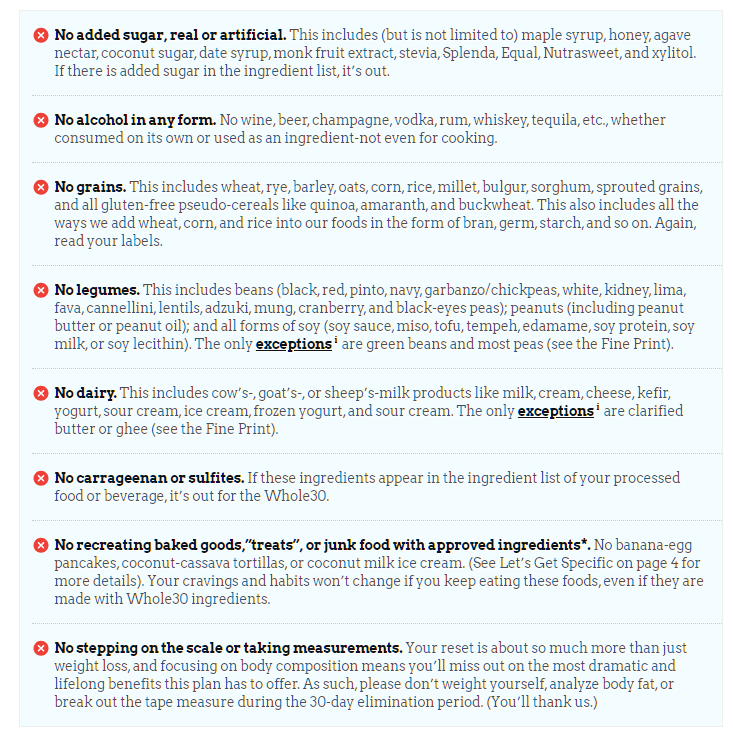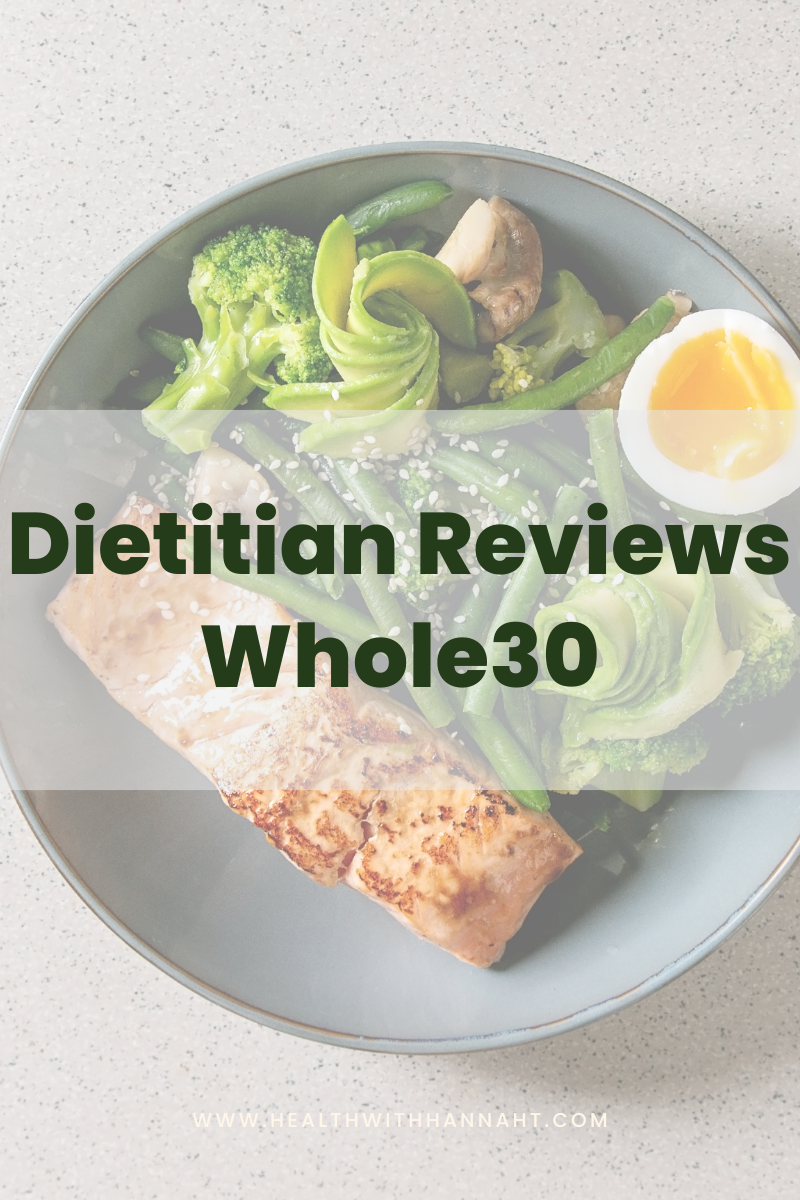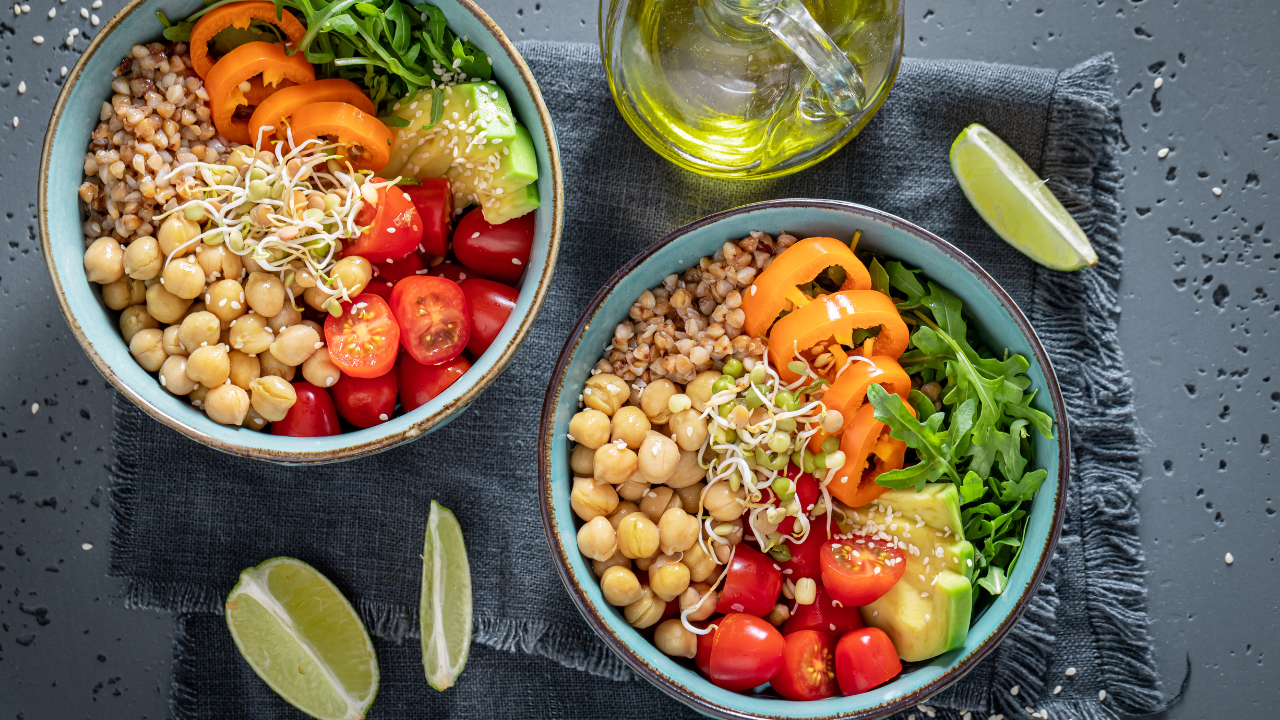Dietitian Reviews Whole30 | This Isn’t Food Freedom
Whole30 has been around for 14 years and continues to be wildly popular. I have yet to do a full review of this elimination diet and it appears there are claims that Whole30 can lead to “food freedom”, so I was basically summoned to write this post.
If you’re new here, hello and welcome! My name is Hannah and I am a non-diet dietitian here to help you improve your relationship with your food and finally find food freedom.
What is Whole30?
Whole30 is a program that was founded in 2009 by Melissa Urban (formerly Hartwig) and Dallas Hartwig. The program involves a 30 day elimination diet followed by 10 days of reintroduction of some of the foods.
Which foods are eliminated, you ask? The usual wellness culture victims, of course. Sugar, grains, dairy, and some of their close friends.
source: whole30.com
If this no-no list seems random, that’s because it is. The recommendations to remove all of these foods is not evidence based. Yet Whole30 claims that by removing these foods, you will be able to calm sugar cravings, increase your energy, and even cure conditions such as PCOS and anxiety.
I am not going to spend too much time here talking about how anecdotal evidence is the weakest form of evidence or how the creators of Whole30 don’t have any real backgrounds in nutrition science. I also don’t intend to debunk each of the program rules. I can cover most of it by saying that the vast majority of people do not need to eliminate a laundry list of foods from their diet. Unless you have a true allergy or intolerance, you can enjoy grains, legumes, and dairy.
The pros of Whole30
This would not be a fair diet review if I failed to share some of the bright spots of Whole30. Now there aren’t many, so this should be quick.
Potentially tasty recipes
I can’t say that I have every tried any intentional Whole30 recipe, but hey, maybe some of them are tasty. I know that people love new meal ideas and maybe that will be a beneficial takeaway of doing this diet. Although you should know that you can find recipes that aren’t doused in diet culture and food guilt and you do not need to follow such a restrictive plan just for some new meal ideas.
An alleged shift away from weight loss
One of the Whole30 program rules states “no stepping on the scale or taking measurements” because “your reset is about so much more than just weight loss”. On first glance, I agree. As a weight-neutral registered dietitian, I believe that our health goes far beyond our weight and focusing on the number on the scale tends to shift our focus away from full-body wellness.
However, even though Whole30 claims that weight is not the focus, losing weight is routinely listed throughout the website as one of the benefits of doing Whole30. So even though they are trying to make it seem like they are “different” and “not a diet”, their true colors are still showing.
Plus, in our weight-focused society, any time someone does a diet, they are likely hoping for weight loss as the outcome. Be honest - how would you feel if you did this super restrictive elimination diet and didn’t lose a pound?
The cons of Whole30
Although Whole30 boasts itself as a way to “eliminate cravings”, “improve anxiety”, and “lose weight healthfully and sustainably”, it really is just another diet. Let’s talk about why doing Whole30 will likely do the opposite of what it promises.
Restriction and rules
Whole30 waves the number one red flag for being a diet by having a set of restrictive rules that you need to follow. Even though they say they aren’t a diet, they 100% are.
When we cut out foods and restrict our intake, we are setting ourselves up for the development of an eating disorder. Whole30 claims that following their rules will decrease cravings and food anxiety, but the truth is that it will probably only make them worse.
They make it VERY clear on the website that you must follow the rules in order for it to “work”. There is no room for flexibility and the site is riddled with “no pain, no gain” language, as we’ll discuss next.
Shame, guilt, and “tough love”
Whole30 is well known for their ‘tough love” approach and the website frequently reminds viewers that “it is only for 30 days”. So toughen up!
Shame and guilt have no place in nutrition. This approach is lowkey bullying and will likely do more harm than good.
They even say on the website - “Losing a parent is hard. Fighting cancer is hard. Birthing a baby is hard. The Whole30 may also be hard, but you are more powerful than you give yourself credit for, and I know you can do this too.”
…are we really comparing an elimination diet to grief, cancer, and childbirth? I agree that you can do hard things. But cutting out cheese and bread does not have to be on that list. And it is going to be way more difficult to cope with grief and terminal illness when you are simultaneously struggling with disordered eating habits.
Fearmongering
Along with causing unnecessary fear around the grains, legumes, dairy, etc. listed in the program rules, Whole30 also fearmongers a variety of other foods and ingredients. The diet encourages that you also avoid non-organic foods, GMOs, and vegetable oils. Why? Because this is just another diet that promotes arbitrary food rules without the evidence to back it up.
Co-opting eating disorder recovery language
There is an entire section on the Whole30 website titled Food Freedom and Melissa, the CEO, has published a book called Food Freedom Forever. This might be the part of this review that infuriates me the most.
Food Freedom Forever is marketed to those who have completed the Whole30 elimination diet and are “stuck in the exhausting cycle of yo-yo dieting and the resulting stress, weight gain, uncontrollable cravings, and health complaints” In other words, Whole30 is selling a “solution” to a problem that they created.
Here is the issue with a restrictive diet like Whole30 using the phrase “food freedom” - this is the language used in disordered eating and eating disorder recovery. So when unknowing people see “food freedom” plastered on the Whole30 site, they may believe that Whole30 will be a helpful tool for their recovery.
There is a post here where co-founder Melissa addresses a question about if Whole30 is appropriate for those with a history of or an active eating disorder. The post is incredibly wishy-washy and starts by saying that Melissa takes eating disorders very seriously. Yet the article continues with testimonials about using Whole30 in eating disorder recovery. Clearly our girl Melissa isn’t quite up to date on how eating disorder recovery works. I mean, she definitely is not a qualified practitioner. But the public will listen to anyone when it comes to nutrition advice, so I am not really that surprised that people turn to Whole30 for “food freedom” support.
There is also a quote in the post that states “I admire your dedication in pursuing a healthy relationship with food, and do believe that eating real, nutrient-dense, unprocessed foods is the healthiest way to nourish your body and break unhealthy cravings and habits. Some people with eating disorders (active or in recovery) have found amazing food freedom with the Whole30. The fact that we don’t count or restrict calories, encourage you to eat healthy foods to satiety, and take the scale and body measurements out of the equation may prove to be the paradigm shift that you need to get back to a healthier relationship with food.”
This is wrong on so many levels. Whole30 cannot be promoted as a potential tool in eating disorder recovery. Even though Whole30 does not involve counting calories or weighing yourself, the diet is still wildly restrictive. Whole30 creates food fear, it does not make it better.
The Whole30 website does have a statement that reads “The Whole30 is contra-indicated for those with a history of eating disorders” and “this message is not intended for those with a history of disordered eating, diagnosed or otherwise.” Nice job covering your own arse, Whole30. But even with your fine-print note, many people are unaware that they have disordered eating or an eating disorder and will choose to participate in this program without knowing any better. I work with people on a daily basis that have no idea that their food rules are rooted in disordered eating. And when you have an eating disorder, the idea of eliminating foods and following a strict set a rules can seem very appealing, driving these vulnerable people right into the open arms of Whole30.
Whole30 is not the first diet to borrow the anti-diet language and I know it won’t be the last. Noom is another example of this. As the anti-diet movement grows, diets are receiving more criticism for directly selling weight loss and food rules. So they have had to get creative in order to keep their diet-y shenanigans up and running. If you can’t beat ‘em, join ‘em, right?
What to do instead of Whole30
If Whole30 works for you, that is fine and dandy. I’m glad you have found an approach that you enjoy. However, I know that many people have and will continue to fall victim to Whole30’s flashy marketing only to be left with a worsened relationship with food.
If you are ready to ditch the diets, you can work with me by joining my signature program to learn more able implementing gentle nutrition to improve your health without dieting.
Bottom line - Whole30 is not “food freedom”
Whole30 is just another wolf in sheep’s clothing. Any time a diet says “we aren’t a diet, we are a lifestyle”, you can almost guarantee it’s a restrictive diet. Whole30 is just a month long cleanse that is rooted in diet culture rather than science.
I also want to note that if you’ve tried Whole30, there is no shame in that. They’ve got some flashy marketing and they really make it seem like they are promoting “food freedom”. I myself would have fallen for something like this in my disordered eating days.
If doing Whole30 just lead to more cravings and food anxiety, please know that this is not because you “lack willpower” and are incapable of doing hard things. The truth of the matter is that Whole30 is restrictive and promotes food extremes, which is not optimal for the human psychology.
Learn more
Featured podcast episode
Want more help on your food freedom journey?
Join my signature membership to become part of a community of ex-dieters working towards food freedom and making peace with food so they no longer need to cut out their favorite foods.

































